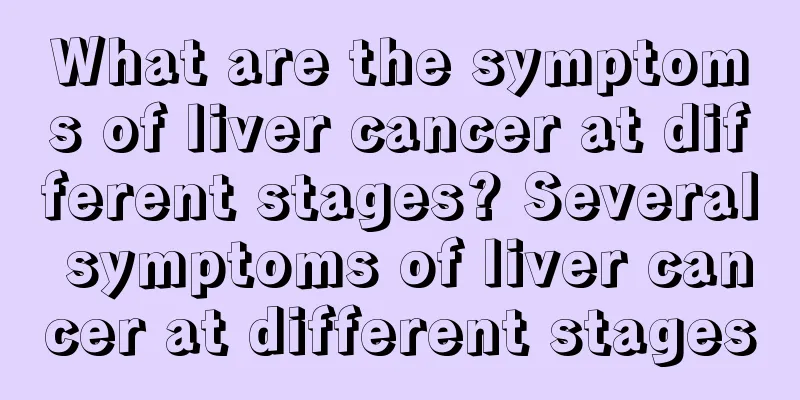What are the symptoms of endometrial cancer

|
The cause of endometrial cancer is complex, and it is also a disease with a very high incidence rate. Many friends will experience symptoms of endometrial cancer, which seriously harms the patient's health. Therefore, female friends should understand the symptoms of endometrial cancer clearly and learn about the related manifestations. 1. Vaginal bleeding: It is the most important clinical symptom of endometrial cancer. It manifests as postmenopausal vaginal bleeding. Many endometrial cancer patients are postmenopausal women, and more than 90% have vaginal bleeding. It manifests as continuous or intermittent vaginal bleeding, with varying amounts. Generally, the amount of bleeding is not much, and heavy bleeding is rare. There are also cases where there is sudden heavy vaginal bleeding several years after menopause. Perimenopausal vaginal bleeding manifests as menstrual cycle disorders, prolonged menstruation or increased menstrual flow, or irregular vaginal bleeding. About 20% of endometrial cancer patients are perimenopausal women. Another 5% are women under 40 years old. 2. Vaginal discharge: About 1/3 of patients have increased vaginal discharge, which is manifested as serous or bloody secretions. When combined with intrauterine infection or pyometra, the discharge may be purulent or purulent and sometimes have a foul odor. Pain, usually does not cause pain. A small number of patients have lower abdominal pain, which is persistent pain or distending pain, which may be related to the stimulation of intrauterine contracture by the large lesion protruding into the uterine cavity. The pain is more obvious when there is fluid accumulation or pus in the uterine cavity or when the advanced cancer infiltrates the surrounding tissues or compresses the nerves. It manifests as persistent pain in the lower abdomen, lumbosacral region and legs. Systemic symptoms: patients with endometrial cancer generally have obesity, diabetes, and hypertension. In the early gynecological examination, the pelvic examination is mostly normal. In the late stage, there may be signs of uterine enlargement, adnexal masses, anemia, weight loss, cachexia and distant metastasis. 3. Postpartum infection and infected abortion: It is the most common cause of endometritis and also the most serious type. Endometritis can occur in cases of intrauterine contraceptive device placement, radium needle, cervical dilation and scraping or cervical electrocautery, endometrial polyps, submucosal uterine fibroids or endometrial cancer. The causes of chronic endometritis are basically the same as those mentioned above. In the acute phase of endometritis, the endometrium is congested, edematous, and infiltrated with inflammatory cells. In severe cases, suppuration occurs. Patients present with fever, abdominal pain, increased vaginal discharge, which is bloody or purulent. Acute endometritis can further develop into myometritis, salpingitis and pelvic inflammatory disease, aggravating the condition. The chronic phase may be asymptomatic, sometimes with irregular vaginal bleeding and abnormal menstruation. The main manifestations of acute endometritis are fever, lower abdominal pain, increased leucorrhea, sometimes bloody or foul-smelling, and sometimes a slightly enlarged uterus and tenderness. The symptoms of chronic cases are basically the same, and may also include menorrhagia, lower abdominal pain, and obvious swelling in the lumbar area. 4. Sexual intercourse aggravates symptoms: Sexual intercourse is strictly prohibited in case of acute endometritis, as it can easily cause the inflammation to spread further. Also, due to increased vaginal discharge, abdominal pain, backache, heaviness and other pains, women's interest in sex decreases and becomes boring. Even if the inflammation is controlled, it is not advisable to have sex too often just after resuming sex, so as to avoid pelvic congestion and recurrence of the disease when the resistance is low. Chronic patients usually have backaches, and sexual intercourse aggravates the symptoms, such as increased leucorrhea, abdominal pain, and aggravated swelling in the lumbosacral region. It is not advisable to have sex too often, and even if they force themselves to have sex, they will not feel pleasure or orgasm. Or there is pleasure and orgasm at the time, but the pelvic congestion after sex causes the symptoms to reappear or worsen. |
<<: How long does it take to get pregnant after endometrial cancer surgery?
>>: What are the symptoms of endometrial cancer
Recommend
If you have toxins in your body, be careful of these symptoms
The body needs to excrete toxins, because toxins ...
How long can you live with kidney cancer?
Kidney cancer, also known as renal cell carcinoma...
How to detect cervical cancer? Early symptoms of cervical cancer
Cervical cancer is a common malignant tumor among...
Does doxolidine injection have any adverse reactions?
Doxolol for injection is mainly used to treat bro...
The most important daily health care for ovarian cancer
Among the many gynecological diseases, ovarian ca...
The ten most popular diseases nowadays
With the development of science and technology, w...
Can breast cancer patients take a hot spring bath?
Breast cancer patients can usually take a hot spr...
What foods can prevent liver cancer? Dietary health care methods for liver cancer patients
The bitter melon in bitter melon is known as the ...
How long can a person with kidney disease live on dialysis
The most serious type of kidney disease is uremia...
What are the factors that cause muscle spasms
In fact, muscle cramps are what we usually call c...
How to treat blurred vision? Teach you four methods to easily treat blurred vision
Sometimes we may encounter blurred vision, and we...
Why do I feel dizzy all day long?
Many diseases have symptoms of dizziness. Some hy...
Does blushing after drinking alcohol increase the risk of liver cancer?
In recent years, liver cancer has become a major ...
Things to note after prostate biopsy
When prostate cancer is suspected, a prostate pun...
What should I eat if I suffer from insomnia and memory loss
With the rapid development of society, the pace o...









